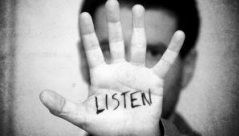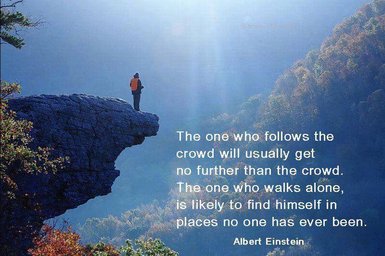|
It's when we take time to listen for what isn't being said that we move forward by leaps and bounds in our conflict resolution efforts, and ultimately (ideally) results.
But let's first back up to an understanding of conflict resolution. Without resorting to a dry, 'dictionary-esque' definition I propose we view conflict resolution as the process of getting to reconciliation. Reconciliation involves something deeper than a quick, simple apology that sticks a 'band-aid' on a situation. It's much more whole and healing, and it sets up the relationship for greater strength in the future. Conflict resolution involves these key steps. They may or may not necessarily happen in this order as sometimes resolution discussions take different twists and turns. Generally, these steps will be included in the process of getting to reconciliation: (a) listening (b) determining the contributions that lead to the conflict (c) offering and accepting apologies as needed (d) exchanging ideas for a solution(s) (e) offering and receiving forgiveness, and (f) agreeing on a solution. Each part of this conflict resolution process is necessary for getting to reconciliation. We can't pick the parts we like, or those that are most comfortable, and skip the others. Conflict resolution can be messy. It's not simple. It takes work. But that's why when we get to reconciliation there is more of a wholeness and 'healed' feeling to the relationship. Do you agree? What other thoughts do you have about conflict resolution and reconciliation? I'd love to hear them.
1 Comment
LIKEABILITY ... among other qualities and character traits, our kids need likeability. It's what brings favor, honor, respect from others, and leads to future 'promotability'. Likeability is defined as:
When a conflict's resolution is about power, the question of right & wrong is sidestepped, creating a profound distortion of what apology is meant to be.
Curse of the Good Girl by Rachel Simmons (page 72) I'm thoroughly enjoying reading this book at the moment and this statement above caught my attention. The book breaks down the issues with how, primarily girls, deal with conflict and try to maintain their "Good Girl" status in the process. It's becoming more clear with each turn of the page that they are not doing a good job with conflict resolution. And, thankfully, it further affirms the need to teach girls AND boys how to properly deal with and resolve conflict ... for the present and future health of their relationships throughout life! Friendship Fixer lessons make a big point about understanding the contribution to the conflict, properly dealing with it ... and remembering that it doesn't end with apology. We like to say, "A friendship is fully fixed when forgiveness is found." So, what do you think apology is meant to be? I'd love to hear your thoughts. (NOTE: While I don't appreciate some of the language used in the book it's clear the author is maintaining the integrity of direct quotes from the groups of pre-teen and teen girls she has been doing research with at her Institute.) Walking the path less traveled is bold. Sometimes it is purely peaceful and necessary for one's rejuvenation. Other times, walking the path less traveled, standing alone, requires insane courage ... like in the face of bullies, or in response to repetitive and nagging friendship issues. Courage is what's needed to defeat bullies. Courage requires leadership, confidence, compassion, and empathy. Yes, perhaps there is more to courage, however, these are the 'biggies'. Notice the combination of strong and gentle? Some of the best 'bully-thwarting' phrases are, "Stop, leave me alone!" or "Stop, don't do that!" or "No, don't do that!" Said with confidence and conviction, these have been proven to dramatically reduce and/or eliminate the bullying behavior. What NOT to do in response to a bully: cry, whine, insult, threaten. More posts to come on this topic.
Questions: How do you incorporate these characteristics into your role modeling for the next generation? Or when was the last time you needed to demonstrate courage? How did it go? Please share your comments. What does it make you think of? Foreign diplomats, flags, fancy buildings, multiple languages? Being an ambassador is a concept built into the Friendship Fixer program. For example, once children are taught how to resolve conflicts, they can more easily function as ambassadors to others; passing on the skills and tools and representing healthy friendships ... building bridges with each other. Can we agree that more "bridge building" is a good thing for our society? Here are a couple insightful descriptions of an ambassador I heard recently while listening to Tom Holladay, and I've added some of my correlating thoughts:
"Knowing how to resolve conflicts and unify people contributes to winning in business and leadership. The ability to bring people together through a common language like conflict resolution skills builds a culture of excellence." -Dave Ramsey, EntreLeadership
Who doesn't want to win in business these days? With so many tips and techniques, methods and models, it's easy to get lost in knowing what creates effective leadership. Let me simplify: it's people skills. The ability to navigate people issues with savvy while passing along valuable learning and skills is something seen in every great leader. So, how are your people skills? More importantly, how are your conflict resolution skills? You see, people and problems tend to go together. We don't set out to have it that way (ok, most people don't anyway), but it happens. Since most adults lack the basic conflict resolution skills necessary to navigate today's world, consequently, so does the next generation. If adults are not prioritizing the learning and honing of these skills, how are they going to be able to effectively pass them on to the next generation? The old cliche that "someone else will do it" still teases most of us into thinking it's true. It's time to change that. Leadership gaps will always exist but that's no excuse not to step up and do something better. Let's grab hold of the value of healthy relational skills ... not only in our adult lives, but also to be able to put something truly useful into the backpacks of the next generation. Check out www.friendshipfixer.com for more information today! |
AuthorWife, mother, sister, daughter, friend, lover of dark chocolate and books, the beach, healthy living, meaningful education, and of course, friendship. Archives
January 2013
Categories
All
|
Copyright 2012 Forever Friendships Publishing. All rights reserved.


 RSS Feed
RSS Feed